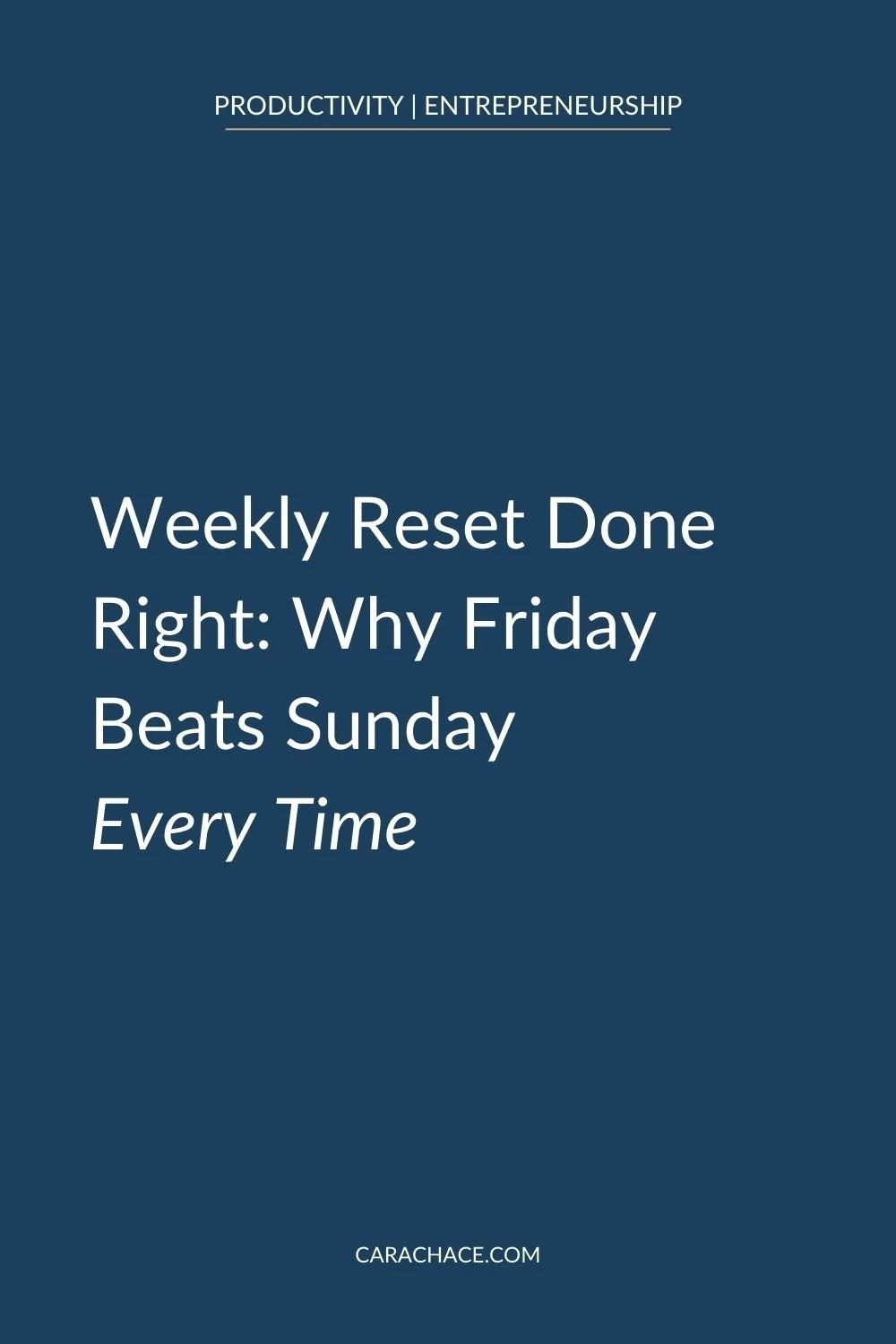Weekly Reset Done Right: Why Friday Beats Sunday Every Time
Sundays are supposed to be about family, relaxation, and recharging. Yet, for many busy women—especially those who juggle businesses, family schedules, and personal goals—Sundays turn into “prep day.” The result? Anxiety creeps in as Monday looms, leaving you overwhelmed and underprepared.
This all-too-common experience is known as the Sunday Scaries, and it’s a productivity and mental health thief. But here’s the good news: there’s a way to avoid them entirely.
The solution is the Friday Weekly Reset, a strategic weekly reset routine for entrepreneurs and busy moms designed to help you wrap up your week, clear mental clutter, and create a roadmap for the week ahead.
By tackling this process on Friday, you end the week feeling accomplished, start Monday prepared, and reclaim your weekend for what it’s truly meant for: rest, connection, and joy.
Here’s why Friday beats Sunday every time—and how to master the weekly reset.
Why You Should Never Do a Weekly Reset on Sunday
If you’ve ever tried to organize your life on Sunday, you know it comes with challenges:
Mental Resistance: By Sunday, your brain has been in weekend mode, making it harder to tackle big-picture planning tasks. If you run out of time to plan your week on Sunday (or just don’t have it in you), then Monday morning ends up being eaten by those planning tasks.
Interruptions: If you’re spending Sunday reflecting, planning, and tidying up loose ends, you’re losing time you could spend relaxing with your family or doing something nourishing that you love (like reading a book).
Lingering Stress: Open loops—unfinished tasks and unorganized thoughts—continue to churn in your mind all weekend, preventing true relaxation.
High work-related stress over the weekend impairs recovery and can lead to burnout. Waiting until Sunday to reset adds to this stress rather than alleviating it.
Shifting to a Friday weekly review instead lets you start the weekend with a clear head. This strategic move is about ending your workweek stress-free and reclaiming your precious downtime.
The Mental Load Moms Carry: Why a Friday Reset Helps
As a busy mom, the mental load is more than just managing tasks—it’s managing everyone’s schedules, needs, and expectations. Even when you’re “off,” your brain might still be “on.” Ask any woman who wakes up in the middle of the night planning every scenario and Plans B-Z…
That’s where the power of a Friday Reset lies.
Closing Open Loops: According to David Allen, author of Getting Things Done, open loops—unfinished tasks or unresolved commitments—occupy mental bandwidth, making it harder to focus or relax. A Friday Reset lets you write down, sort, and prioritize these loops, freeing your mind.
Prepping for Monday: When Monday begins without a clear plan, it creates chaos. But when you’ve outlined priorities in advance, you can dive straight into focused work.
Shutting Down Mentally: A Friday Reset allows you to symbolically close the door on your workweek. By physically organizing your workspace and mentally processing your tasks, you signal to your brain that it’s okay to switch off.
This intentional approach helps you plan your week before the weekend, creating a sense of control and calm.
Step-by-Step Guide to a Friday Weekly Reset
Here’s how to implement a weekly reset routine that works for you by setting aside 30–45 minutes as the last task of your Friday workday.
Step 1: Reflect on the Week
Before you can plan ahead, take a moment to look back. This is about celebrating your wins and pinpointing where things went off track.
Questions to Guide You:
What accomplishments am I proud of this week?
What unexpected challenges came up?
Where did I fall short, and what can I learn from it?
How did I feel throughout the week? More calm or more chaotic?
For example, if your challenge was balancing client deadlines with family needs, acknowledge it and brainstorm solutions. Could you schedule blocks of focused work next week? Delegate a task? Say no to the next obligation? Reflection isn’t about guilt; it’s about growth.
👉Pro Tip: Keep a dedicated notebook or digital document for these reflections. Over time, you’ll notice patterns and improve your ability to tackle recurring challenges.
Step 2: Brain Dump All Your Thoughts
This is where the magic happens. Take out a blank sheet of paper or open a note-taking app, and write down every task, idea, or worry bouncing around in your mind.
Include:
Tasks you didn’t finish this week.
Commitments coming up next week.
Random ideas (e.g., “Sign up for yoga class” or “Plan kid’s birthday party”).
A study in the Journal of Experimental Psychology found that writing down unfinished tasks helps reduce anxiety about them. Once your brain trusts that everything is captured, it stops trying to hold on to it.
This step helps you address mental clutter and ensures you’ll end your workweek stress-free.
Use categories to organize your brain dump:
Work tasks
Home projects
Family activities
Personal goals
This approach makes it easier to prioritize and see what’s on your plate for each area of your life.
📌 Related Read: How to Do a Brain Dump to Beat Overwhelm and Take Action
Step 3: Organize and Prioritize
Now that your brain dump is complete, it’s time to make sense of it.
Sort Tasks Into Categories:
Urgent: Must be completed next week (e.g., client deadlines).
Non-Urgent: Can be done later or scheduled in advance (e.g., decluttering the garage).
Delegate: Assign to someone else (e.g., outsourcing dinner prep one night).
Eliminate: Cross off anything unnecessary or outdated.
Create Your Plan:
Plan Urgent Tasks First: Make sure you create space for getting the must-do tasks done instead of hoping you have time after the kids go to bed.
Break Big Projects Down: For example, instead of writing “Plan holiday party,” break it into actionable steps like “Create guest list,” “Send invites,” and “Order decorations.”
Design Your Ideal Workweek: Map out your week with a structure that supports your goals and energy levels. For example, reserve mornings for deep focus tasks and afternoons for meetings or lighter work.
Incorporate Theme Days: Assign specific days of the week to recurring types of tasks, such as "Admin Mondays," "Marketing Tuesdays," or "Client Call Thursdays." This reduces decision fatigue and ensures everything gets dedicated time.
Plan Buffer Time: Leave room in your schedule for unexpected tasks or follow-ups to prevent your week from feeling overbooked.
Sync Your Workweek With Personal Priorities: Make time for family events, self-care, or hobbies by scheduling them with the same importance as work commitments.
💡 Explore More: Time Blocking Not Working For You? Try This Easy Productivity Tip Instead
Step 4: Tidy Your Workspace
Clearing physical clutter is just as important as clearing mental clutter. Studies from Princeton University show that cluttered environments increase stress levels and reduce productivity.
File away papers and tidy your desk.
Declutter your email inbox by archiving old messages and deleting junk.
Organize digital files into folders for easy access next week.
Physically wipe down your desk area to get rid of dust, coffee mug rings, and old scraps of paper and post-its.
This simple act signals closure, creating a sense of accomplishment.
Step 5: Shut It Down and Unplug
The final step is to transition from work to weekend.
Symbolic Actions to Close Out Your Week:
Power down your computer.
Create a short gratitude list for the week.
Play your favorite song.
Enjoying a small Friday treat (hello, iced latte or chocolate!).
These small practices and habits help mark the end of your workweek and mentally prepare you for rest.
Pro Tips to Make Your Friday Reset Stick
Set a Reminder: Schedule your Friday Reset in your calendar as a non-negotiable event.
Pair It With a Reward: Treat yourself to something small afterward—your favorite coffee shop treat or an episode of your favorite show.
Make It Personal: Add elements that matter to you, like journaling about personal goals or setting weekend intentions.
Why Friday Beats Sunday
Here’s why Friday is superior for your weekly reset:
You’re Still in Work Mode: On Friday, you’re already in a task-oriented mindset, making it easier to tackle reflection and planning.
You Start the Weekend Relaxed: By clearing your mental load on Friday, you free your weekend for guilt-free rest.
You Avoid the Sunday Scaries: With everything handled, you can fully enjoy Sunday without the anxiety of unfinished tasks hanging over your head.
The Bigger Picture: Reclaiming Time and Mental Energy
By adopting a Friday Reset habit, you’re not just improving your weekly routine—you’re making an intentional choice to prioritize your mental health and time.
Imagine spending Saturday at your kid’s soccer game, fully present because you’re not mentally running through your to-do list. Picture Sunday evening, snuggled on the couch with a book, instead of dreading Monday.
It’s a small shift with a big payoff.
Conclusion
Life is full, especially for type-A moms managing family, work, and personal goals. But a Friday Weekly Reset offers a simple, effective way to regain control, reduce stress, and protect your weekend.
Start your first Friday Reset this week. Block off 30 minutes, follow the steps, and notice how much lighter and more prepared you feel when Monday rolls around.
Say goodbye to the Sunday Scaries—for good.
Related Posts & Mentioned In This Blog:
How to Do a Brain Dump to Beat Overwhelm and Take Action
When Do You Work? 3 Ways to Map Your Energy to Boost Productivity
Time Blocking Not Working For You? Try This Easy Productivity Tip Instead
Avoid Burnout: 7 Types of Rest for Busy Work-from-Home Entrepreneurs
-
American Psychological Association: "Give me a break" This article discusses the importance of detaching from work during off-hours to reduce burnout and improve life satisfaction.American Psychological Association
Journal of Experimental Psychology: "Memory for Incomplete Tasks: A Re-examination of the Zeigarnik Effect" This study revisits the Zeigarnik Effect, which suggests that people remember unfinished or interrupted tasks better than completed ones.Apatlano
Princeton Alumni Weekly: "Psychology: Your Attention, Please" This article explores how visual clutter competes with our brain’s ability to pay attention and tires out our cognitive functions over time.Princeton Animal Welfare
David Allen's "Getting Things Done: The Art of Stress-Free Productivity" This book introduces a productivity methodology that helps individuals manage tasks and commitments effectively. Amazon


